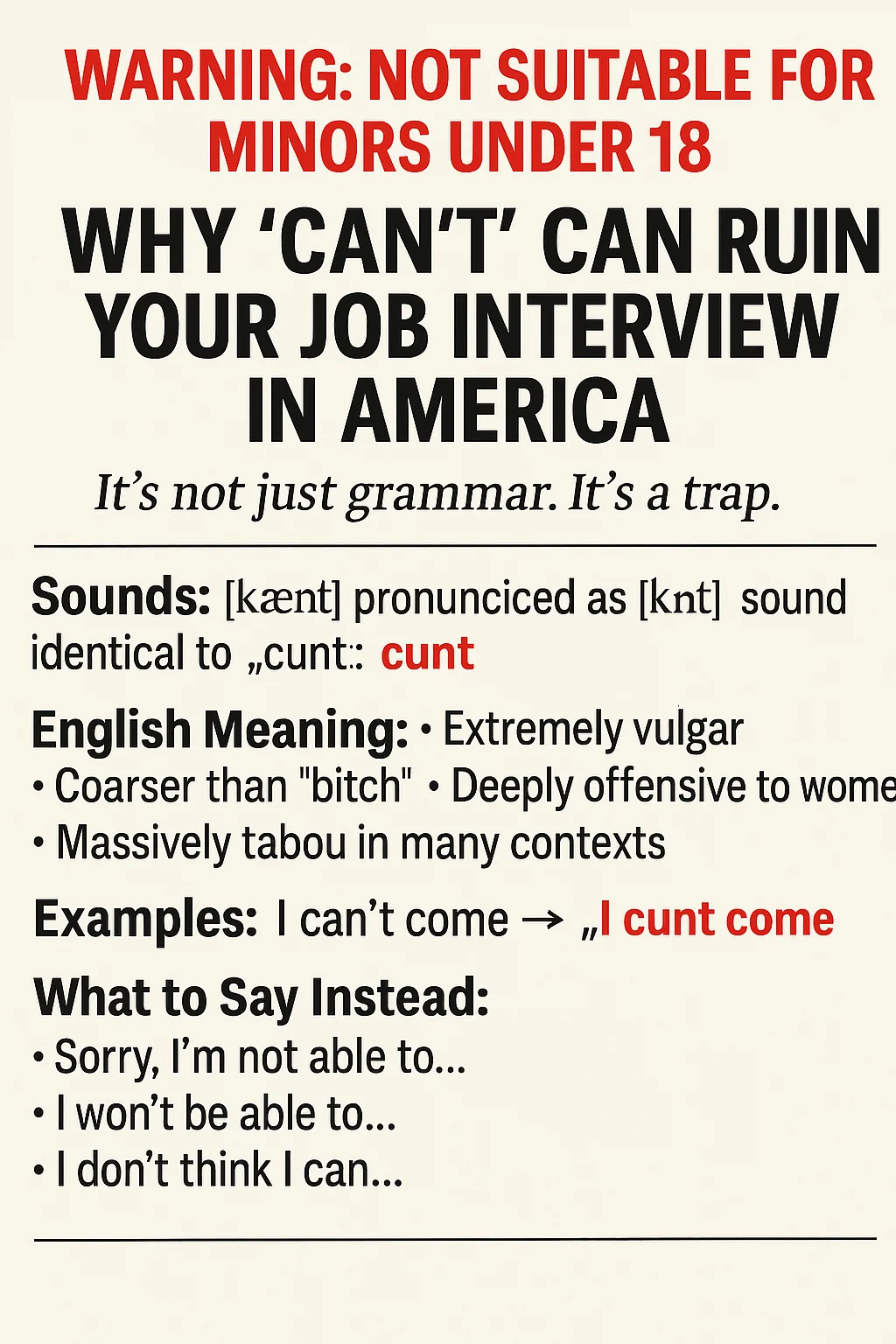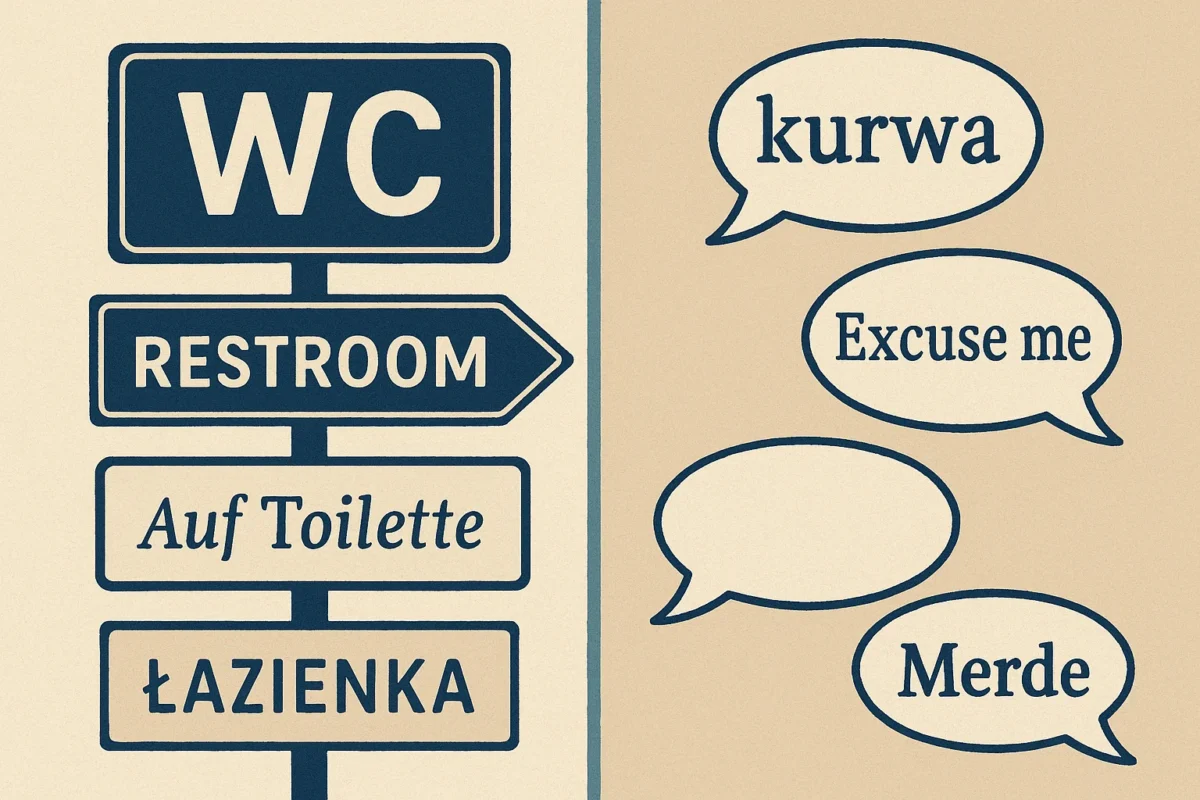Why This Article Matters
You never planned to learn words like kurwa, refill, oder auf Toilette, yet they found you first.
This article explores the first words we absorb in a new language — not from textbooks, but from real life. These are words of survival, shock, politeness, and instinct. And they say more about a culture than we might think.
The First Words We Never Meant to Learn
You land in a new country. You’re not fluent yet, but somehow your brain has already memorized a few phrases. Not “Where are you from?” or “Nice to meet you.”
Instead, it’s:
- “Excuse me.”
- “WC.”
- “Kurwa.”
- “Auf die Toilette.”
Why these? Because they’re not just words.
They are tools for reacting, fitting inund staying polite or safe.
They’re what life teaches first — and they form the foundation of richtige Sprache.
What People Learn First — A Cross-Language Comparison
Before diving in, let’s look at a quick overview of what learners usually pick up first — across cultures and contexts.
| Sprache | Common “First Words” | Why They Stick | Cultural Insight |
|---|---|---|---|
| Polnisch | kurwa, łazienka, do WC, panowie/panie | Emotionally charged + public signs | Emotions direct, social norms indirect |
| Deutsch | Scheiße, Entschuldigung, auf Toilette, Klo, Vorsicht, Quittung | Grammar-structured, action-based | Precision in language and habits |
| English (US) | restroom, excuse me, bathroom, refill | Euphemism + daily function | Avoidance of bodily references |
| English (UK) | loo, cheers, ladies/gents | Class-based variation | Informality with coded status |
| Spanisch | baño, perdón, puta madre, vale | Emotional tone + social warmth | Loud, expressive, affectionate insults |
| Französisch | pardon, toilettes, merde | Playful dual meanings | Polite surface, ironic depth |
| Japanisch | toire, sumimasen, onegai shimasu | Set politeness, loanwords | Hierarchy first, words second |
| Ukrainisch | будь ласка, де туалет, блін, ой | Gentle interjections + rhythm | Warmth with soft emotional tone |
| Russisch | пожалуйста, извините, туалет, блин, ё-моё | Direct, rhythmic, compact | Quick emotion with heavier tone |
🧠 Anmerkung: Teenagers catch slang. Adults memorize phrases like “excuse me” or “how much?” Older learners may focus on structured, polite forms. Our language memory is shaped by what we need and how we fühlen.
Germany: Not Just “Scheiße” — But Structure
German learners often pick up:
- Scheiße! — emotional burst, heard everywhere.
- Entschuldigung — formal apology, subway survival tool.
- Auf die Toilette gehen — precise, visual: “sit on”, not “go into”.
- Vorsicht! — “Watch out!” — signals social urgency.
- Quittung — receipt, key for buying anything.
These aren’t from lessons — they’re from real needs.
German language encodes action and intention directly into grammar. That’s why auf (nicht in) the toilet makes sense: you’re sitting auf, not entering into.
English: Restroom Culture and Euphemism
Americans rarely say “toilet” because:
- Toilet = the object itself (too anatomical),
- Bathroom = softer, private term,
- Restroom = neutral, especially in public.
The culture prioritizes comfort over clarity. That’s why learners hear "Entschuldigen Sie mich" vor “Can I help you?”
In the UK, class shows up in phrases like:
- loo (casual),
- ladies/gents (public),
- cheers (thanks + goodbye — context defines it).
Polish & Slavic Nuance
Polish:
- kurwa = unavoidable in speech — anger, surprise, rhythm.
- do łazienki, do WC, oder to panowie/panie — polite indirectness.
Ukrainisch:
- будь ласка, блін, ой — emotional restraint, warmth, and melody.
Russisch:
- блин, извините, туалет — stronger rhythm, often more direct.
Across Slavic languages, learners quickly tune into intonation, emotional coding, and the use of diminutives for softening everyday talk.
French, Spanish, Japanese — Different Paths to First Words
French:
- pardon, toilettes, merde — dual nature: polite vs expressive.
- merde can mean both “crap” and “good luck” (like “break a leg”).
Spanisch:
- baño, perdón, vale, puta madre — intense and warm.
– Curse words used affectionately, but learners may not realize when not to copy them.
Japanese:
- toire (from English), sumimasen, onegai shimasu — harmony, fixed structures, respect above all.
What These Words Teach Us
These words are more than expressions. They are linguistic snapshots of:
- What a culture values (privacy? bluntness? politeness?),
- What it avoids (bodily terms? direct orders?),
- How it reacts under stress or routine.
That’s why your first words matter.
They show what your host society notices first — and what it wants Sie to notice too.
How We Teach It Differently
Unter Start Language School von Tymur Levitin, we embrace what students really notice:
- Emotional words
- Functional phrases
- Accidental mistakes
- Survival-level reactions
We believe that real fluency begins with real exposure. That’s why we treat accidental vocabulary as a window into cultural logic, not an embarrassment.
🔗 Explore More:
- Learn German the Right Way
- Speak English with Confidence
- Explore Our Polish Program
- Read More from Our Language & Translation Blog
📌 Conclusion: Don’t Apologize for Your First Words
Your first foreign words aren’t wrong — they’re raw data from culture.
If they’re rude, awkward, or strangely specific, all the better.
You’re not memorizing — you’re absorbing.
That’s how real learning starts.
Autor: Tymur Levitin — founder, director, and lead teacher of Start Language School by Tymur Levitin / Levitin Language School
© Tymur Levitin, 2025. All rights reserved.
























